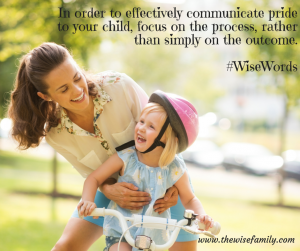It’s that time of year – GRADUATION! And a time of pride for teens, young adults and parents around the country. And although celebrations are important, we are often guilty of spending too much time (and emotional energy) focusing on the outcome – rather than on the effort it may (or may not) have taken to get there.

As parents most of us are proud of our children, but recent studies have found that we don’t always do a good job of communicating that feeling. That’s unfortunate because when kids are aware of the pride their parents have in them, the result is usually a much stronger relationship. And a stronger relationship can be important as our kids move into the teen and young adult years, want more independence and often find themselves in conflict with our (“outrageously unfair”) parental rules and regulations.
So how do you go about effectively communicating the pride that you feel for a son or daughter? One starting point is not to praise everything, especially the low-effort accomplishments that your WISE offspring knows isn’t really worthy of praise (“Great job of finishing that bowl of cereal, kiddo!”).
Offering praise for things that really aren’t challenging and really aren’t much of an accomplishment ends up turning all of our praise into “white noise,” background words that don’t carry much meaning or worth and which our kids often ignore. As my 16-year-old daughter WISELY said, “If everyone is special, then, really no one is.”
One hint to effectively communicate pride in your child is to focus on the process, rather than simply on the outcome. When a child is working hard and putting in extra effort, a parent offering praise is heard and appreciated. What you are doing is highlighting the effort and initiative of your child, rather than focusing on only the results. Try, “Wow! All of your extra studying and staying after with the teacher really helped bring your grades up this semester!”
When we praise our kids for putting in that extra effort, it becomes a reward that reinforces the work they’re doing and makes it more likely that they will want to continue to try as hard in the future.
Don’t just assume that your kids are aware that you’re proud of them. And be sure to find a correct balance between offering too little or too much praise. We have to recognize when our children are pushing themselves to try something new or to work a little harder. That’s the time to compliment and let them see how pleased you are of the effort they’re making.
The end result may not be a first place trophy or any measurable success, but your child will know that you’re proud of his or her trying – and be much more likely to try the next time!
Be Wise!

Content adapted from material shared by the American Counseling Association and the upcoming book, Living the Life You Want Your Kids to Lead: A Grown-Ups Guide to Good Behavior.
“Dr. Amy talks about moving children from being externally-driven to internally-driven…and she helps you get there!”
— Parent of 15-year-old daughter“Thank you so much for all you do and care for me. And all the work you do for my family. I {heart} you.”
— 10-year-old coaching client“Dr. Amy is like Oprah – she’s the neighbor you love who is very, very smart”
— Parent of 14-year-old son and 18-year-old daughter“This is my 1st visit at WISE with my son. So far I am very thankful and impressed by the space. I feel light and comfortable here while my son works on his growth. I appreciate that you curated the process well.” ~ WISE Family parent
— Thankful and impressed by the space